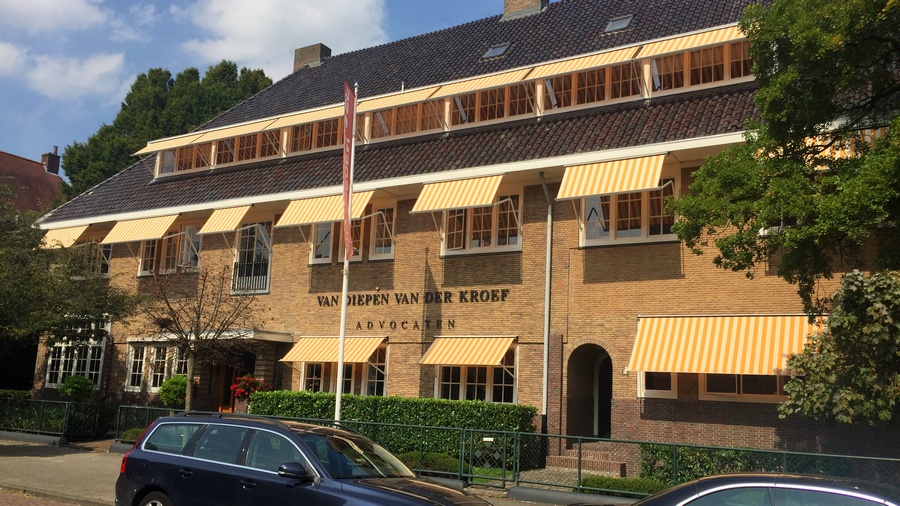"Van Diepen Van der Kroef lawyers about agility, transparency and people"
What is the vision and approach of Van Diepen Van der Kroef advocaten when it comes to growth?
Talked about this Arthur van der Kroef, partner and co-founder of Van Diepen Van der Kroef advocaten, with Rob Meijers and Diederik Gosewehr from 4Future.
This conversation is part of the series'Conversation about Growth', an initiative of 4Future in which we talk to business service providers about growth: what is their vision, what are the challenges, how do they deal with this, and what are their priorities for the future?
Vision on growth
"I think organizations need to grow to have a future. If you have a 'stand still' in any area, it will eventually lead to others overtaking you. So growth is a prerequisite for us to exist.
We are therefore an office that has grown prominently. We once started in a small town in North Holland, John van Diepen and I, and we have grown into an office that has secured a permanent place in the top 10 to 20. And we are the only one who has succeeded. "
Good people and agility
"Our first growth goal is to find good people who can achieve growth. That is a huge challenge in this market. Now that the economy is going well again, this is actually the biggest bottleneck for growth.
And our second priority is agility or agility. Our goal is to create an organization that can respond quickly to change, because the market changes very quickly and that is why you have to be agile to be able to adapt to it. "
About Van Diepen Van der Kroef advocaten
Van Diepen Van der Kroef Advocaten is the largest independent law firm in the Netherlands, with approximately 80 specialists in various jurisdictions. Grown from the will and dare to do business. Born from an urge to make this complex world as clear as possible. Van Diepen wants to distinguish itself by a direct, goal-oriented approach: proactive, 'to the point' and with a sharp eye.
Flexibility in sector focus
"It is very important that you focus on those sectors where you expect the greatest growth opportunities in the near future. To give an example of how quickly that can change: we were and are the market leader in insolvency law. Then the economy picks up and now there are almost no more bankruptcies, and now you see that the market no longer asks to solve insolvency issues, but rather expertise in completely different sectors, so if you are not agile, it is very dangerous in this market .
I give another example: in the crisis, real estate came to a complete standstill. And intellectual property was a disaster. Now they are going to make inventions again, patents, patents, copyrights, they are going to build again, all kinds of administrative problems are at play again. As a result, these sectors that had come to a complete standstill are now growing very fast. "
"That is the secret of the whole story: in difficult times you don't have to send everyone away, because then you will miss the boat when sectors pick up again."
"You cannot always achieve growth, but you have to make sure that you are always ready for it. We have done that successfully: during the time of thickening we have become much stricter and we have set higher standards. That led to a decrease of the number of people, but in such a way that we were left with the people we needed when opportunities for growth arose again. "
Training for agility
"You can work very well with this in your training model: you can train lawyers broadly, for example in a general practice where people develop multiple skills. Then you can let them grow into a specialization, looking at what the market demands. That is a completely different model than you say, for example: “intellectual property is now booming, so I am looking for a super specialist in that area.” When I look at fellow offices, I think specialization has often gone too far.
To be agile, you need to have enough people with the right capabilities available. That is a medium to long term story, because you actually have to estimate which people you will need in 5 years' time. We therefore adhere to the 'Ajax model'. This means that you train people as much as possible within your own culture - and that includes agility. In addition, you have to hire people who are able to switch quickly, personalities who are very flexible. "

Own responsibility and transparency
"In order to be agile, it is also important that you support people early in their commercial development. That is important: you can still be such a good lawyer, but you also have to bind your customers. you get new customers through your customer approach: you have to think from your customer and not from your own club. That is in our DNA. You have to appreciate it when people work on this. So don't just think about 'billable hours', if you your people will not develop commercially either.
So it is important that you train people commercially and also give your own responsibility. In many offices, the turnover achieved, which is the output of the process, is completely kept away from the own people. That means that you are not agile and you cannot blame your people if you do not involve them at all. Then you get people who are in a room and are busy for themselves. The Dutch legal profession is a fairly conservative professional group.
You will have to involve people in your organization and that is only possible if you also involve them in the back of the process. That means you don't keep the output of what you're doing before them. Transparency is key. We are really special in that. I think that is one of the reasons why we score high on the lists of best employers in the legal profession in the Netherlands, and are known as an office where people like to work. "
"Our worst years have often been our best years"
"In years when it is very difficult and where you really encounter existential questions, in those years you intervene, you make your organization agile and ready for the future. Such a change process is not easy. And then, only after two -Three years, you will see fruits that you could not have dreamed of during that bad period. So those are your best years that you realize after that. Then you are proud that you did it. "
Man is central
"We think it is important that people can commit to the organization. While nowadays you see that people have long thought that someone has been working somewhere for 4 or 5 years. We strive to make long-term connections and also grow in this way not only as a professional but also as a person: people are central and all our plans are calibrated to that, which is in particular our long-term goal: that we want to put the lawyer and his or her development at the center of our plans . "
Long-term commitments
"You notice that more and more people are looking for more stability, now that it has all become so loose. We are looking for the kind of people who want to commit to our organization for a longer period of time, that is what our long-term goals are based on. Because you can only grow if you offer these people a future by giving them the opportunity to play an important role in our club. So you have to grow. "
About 'Conversation about Growth'
The growth of business services organizations is on the rise again after a difficult period. Nevertheless, growth remains high on the agenda. For example, because the growth is not going fast enough or not in the desired areas, or because it proves difficult to attract (and retain) good people to man the growth. Or because professionals lack the commercial skills and drive to make the most of growth opportunities. In addition, the sector is faced with many new developments in areas such as technology and revenue models, shortages on the labor market and changing wishes of 'millennials'.
'Conversation about Growth' is an initiative of 4Future in which we talk with directors of accountancy and law firms, consultancy firms and ICT companies about growth: what is their vision, what are the challenges, how do they deal with this, and what are their priorities for the future?

